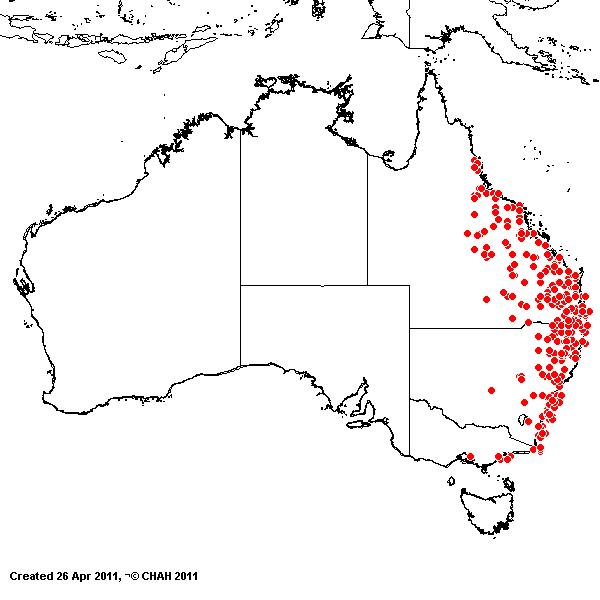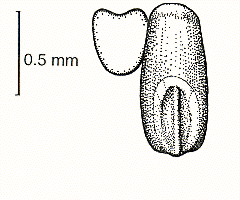Eragrostis leptostachya
(R.Br.) Steud. Syn.
Pl. Glum. 1: 279
(1854).
Classification. (GPWG 2001) : Subfamily
Chloridoideae. Cynodonteae.
Basionym and/or
Replacement Name: Poa
leptostachya R. Br., Prodr. 180 (1812).
Type of Basionym or
Protologue Information: T: 6276, 1802–1805, Australia: "Inter
australiense".
Key references
(books and floras): [1810]. R.Brown, Prodromus (180 as Poa
leptostachya), [1878] G.Bentham, Flora Australiensis 7 (645), [2002]
D.Sharp & B.K.Simon, AusGrass, Grasses of Australia, [2008]
S.W.L.Jacobs, R.D.B.Walley & D.J.B.Wheeler, Grasses of New South Wales
(253).
Illustrations:
[1984] N.T.Burbidge. rev. S.W.L.Jacobs, Australian Grasses (133), [2005] K.Mallet (ed.), Flora of
Australia 44B: Poaceae 3 (Fig. 70K-L), [2008] S.W.L.Jacobs,
R.D.B.Whalley & D.J.B.Wheeler, Grasses of New South Wales, 4th edn
(253).
Habit.
Perennial. Culms erect or geniculately ascending, 20–100 cm tall. Lateral
branches branched. Ligule a fringe of hairs, 0.1–0.3 mm long. Leaf-blades
straight, flat or convolute, 15–25 cm long, 2–3 mm wide. Leaf-blade surface
scabrous.
Inflorescence.
Inflorescence compound, a panicle. Panicle linear or lanceolate, 9–40 cm long,
2–4 cm wide.
Spikelets.
Spikelets pedicelled. Fertile spikelets many flowered, with at least 2 fertile
florets (4–20), comprising 4–20 fertile floret(s), with diminished florets at
the apex, lanceolate or oblong, laterally compressed, 4–14 mm long.
Glumes. Glumes
similar. Lower glume ovate, membranous, keeled, 1-keeled, 1 -nerved. Upper
glume ovate, 1.5–2 mm long, membranous, keeled, 1-keeled, 1 -nerved.
Florets.
Fertile lemma 1.5–2.4 mm long, keeled, 3 -nerved. Lemma apex muticous. Anthers
3. Grain 1 mm long.
Continental
Distribution: Australasia and Pacific.
Australian
Distribution: Queensland, New South Wales, Victoria.
Queensland:
Burnett, Cook, Darling Downs, Leichhardt, Maranoa, Mitchell, Moreton, North
Kennedy, Port Curtis, South Kennedy, Wide
Bay. New
South Wales: North Coast, Central
Coast, South Coast,
Central Tablelands, North-Western Slopes, Central-Western Slopes. Victoria:
Gippsland Plain.
Notes.
Introduced into England and Belgium with
wool shoddy.
Distinquishing characters include glandular
culms, leaf sheaths and pedicels; open panicle, large relative to plant;
spikelets with thickened straight rachilla, often olive-green; unequal glumes,
the lower rounded on the back; lateral nerves on lemma submarginal; caryopsis
rectangular, grooved, striate.
Endemic;
occurs on the E coast and tablelands from near Mareeba in northern Qld. to Melbourne in southern Vic.; introduced into England, Belgium;
Hawaii and Easter Island.
In usually deep, black clays, yellow sandy podsolics, brown loams, and grey or
brown sands; often in forest and grassland clearings, waste ground, and
plantations; in association with basalt, granite and laterite.; flowers all
year round but not recorded in Sept.; fruits all year round but not recorded in
Sept.





